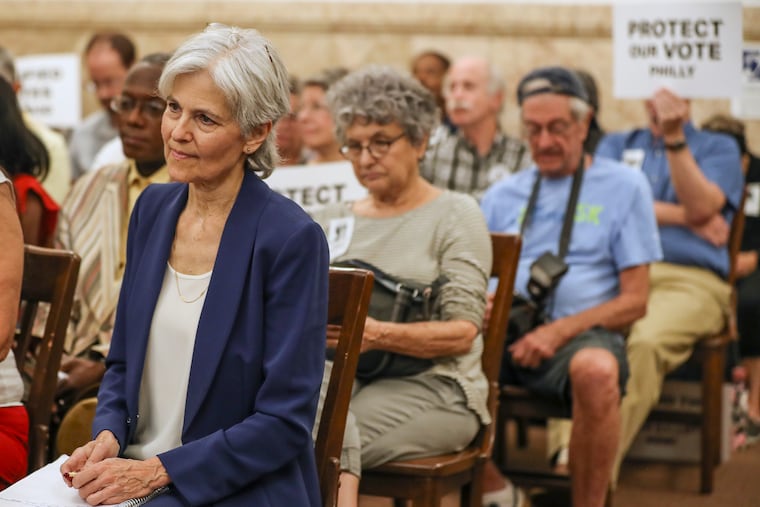Green Party’s Jill Stein threatens legal challenge to Philly’s new, $29M voting machines
The 2016 presidential candidate said the voting machines violate her recount settlement with the state.

Jill Stein, the 2016 Green Party presidential candidate, threatened Wednesday to take legal action to block Philadelphia from using its new voting machines if the Pennsylvania Department of State continues to allow their use.
The machines, which cost the city $29 million, are slated to be used in next month’s election. But Stein said they violate the terms of a settlement she reached with the state late last year stemming from her 2016 recount battle.
“We will seek relief in the court if this unverified, unauditable, hackable, expensive machine is not promptly decertified,” Stein, flanked by about two dozen supporters, said outside the federal courthouse in Center City.
That agreement settled Stein’s effort in 2016 to seek a recount and forensic audit of voting machines in Pennsylvania and elsewhere after Donald Trump’s victory that year. (Stein, an activist and physician from Massachusetts, received 0.82% of the vote in Pennsylvania.)
Under the settlement, the plaintiffs must first notify the Pennsylvania Department of State in writing of potential violations of the agreement; the department then has 30 days to respond before Stein and other plaintiffs can take the matter to court.
On Tuesday night, Stein sent a letter to the Department of State calling for decertification of the ExpressVote XL machines purchased from Election Systems & Software (ES&S).
“The Department of State disagrees with the allegations raised by the Stein plaintiffs,” a department spokesperson said Wednesday in a statement.
» READ MORE: Federal judge to Jill Stein on recount request: Too little, too late
Stein said the ExpressVote XL machines violate the settlement because they do not produce a truly auditable, voter-verifiable paper trail. Instead, she said, the record they produce is difficult for voters to confirm. Although they print plain text that is considered the official record for recounts and audits, the initial tally of results is done using bar codes.
“There’s no way that a voter can actually look at a bar code and know what vote is being counted,” Stein told the city’s acting board of elections Wednesday morning during the public comment period at its regularly scheduled meeting.
In a statement, ES&S said its machine is “safe, secure, and fully auditable.”
While it’s almost certainly too late to roll back the clock for next month’s election, in which the machines are set to debut, Stein said she hopes to prevent them from being used in next year’s presidential election.
For years, most votes in Pennsylvania were cast on electronic machines that did not leave a paper trail. In addition to being less secure than other options, experts widely agree, such systems make it difficult to flag discrepancies or challenge election results because the votes cannot be manually recounted or audited.
Last year, Gov. Tom Wolf ordered every county to switch to new systems with voter-verifiable, auditable paper trails: Voters should either directly make their selections on paper ballots that are then scanned, or use electronic machines that print their selections onto paper ballots in plain text.
The state then entered the settlement with Stein, essentially agreeing to continue with that order and making it binding. Accordingly, the Department of State will only certify voting systems if votes cast are recorded on paper ballots, if a voter-verifiable record is produced for each vote, and following “a robust pre-certification auditing process.”
Department of State spokesperson Wanda Murren said in her statement that security testing of the voting machines was not open to the public “due to voting systems being federally designated as highly sensitive protected critical infrastructure.” She added that the department was following longstanding procedures for new systems.
She also pushed back at Stein and the plaintiffs for bringing the challenge now.
“The original examination of the ES&S system occurred a year ago and the report was issued more than 10 months ago,” she wrote, “and yet the Stein plaintiffs waited until August to raise their allegations.”
Stein said in an interview that she had waited to see whether other attempts to stop the machines would succeed.
Stein’s is the latest attack on the ExpressVote XL machines, following months of criticism from city and state watchdogs and advocates for hand-marked paper ballots. Critics say that the machines are less secure than other options and that the city’s selection process was rushed, opaque, and biased from the start toward the ExpressVote XL. Stein also supports hand-marked paper ballots, calling them time-tested, secure, and cheaper.
» READ MORE: Commissioners select new voting machines for Philly over criticism from advocates
Last week, City Controller Rebecca Rhynhart concluded an investigation into the commissioners’ selection of the system that found that ES&S had lobbied for years to win the city contract. The commissioners’ choice, Rhynhart said, raises ethical questions about conflicts of interest they may have had.
» READ MORE: Philly voting-machine vendor lobbied for years to win contract, city watchdog’s investigation finds
At Wednesday’s meeting, Giovanni Campbell, one of two city judges appointed to the board, said the commissioners and the city are preparing a response to Rhynhart’s report. (The two judges were appointed to replace Commissioners Lisa Deeley and Al Schmidt, who are recused from the board while running for reelection.)
State Rep. Movita Johnson-Harrell (D., Phila.) told elections officials at the meeting that the new machines have security issues and cannot be audited. Some constituents, she said, may avoid voting next year due to concerns about the machines.
“We know this is really going to be important in 2020, to make sure every, every, every person’s vote is counted in this nation, and my constituents in the district are really afraid of these machines,” she said. “And a lot of them are already talking about not coming out to vote. ... It’s going to be a problem for us.”